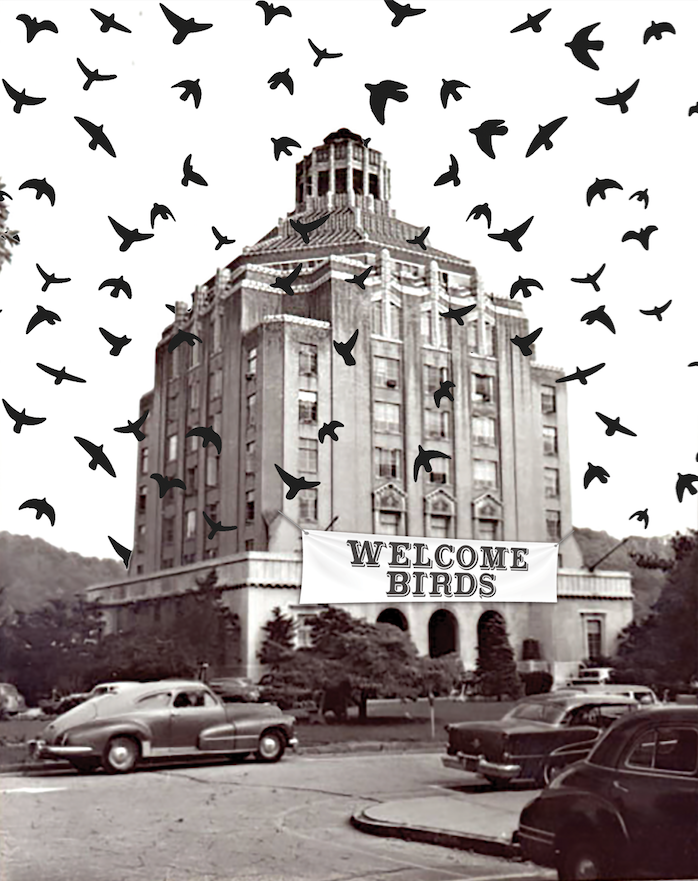In the spring of 1945, the Asheville Bird Club officially launched. “Purpose of the club will be to study the protection of birds and the education of persons interested in birds,” The Asheville Citizen reported on April 25.
Early activities included monthly meetings, film screenings and guest speakers. Members also wrote letters to the editor, promoting the organization’s cause. “So accustomed are we to the service of birds that we take them for granted,” declared one constituent, who identified simply as A Bird Club Member. “Little hope would there be for mankind were it not for the natural enemies of insects, chief among which are the birds,” the writer continued.
By December, the club held its inaugural bird count. In total, 58 observers tallied 3,622 birds of 57 species. The list included 577 English sparrows, 458 juncos and 240 chickadees among others.
Perhaps the club’s most impactful contribution, however, came in 1947, when it teamed with local garden organizations to form a committee that advocated for the city’s formal designation as a bird sanctuary. Such a move, the committee insisted, came with no risk and plenty of rewards. “It means joining an important educational movement in America to protect our desirable birds and conserve our natural resources generally,” the committee declared in a statement published by the Asheville Citizen-Times in its Feb. 23, 1947, Sunday edition.
In addition to educational benefits, the committee continued: “It has definite advertising value to a community, especially to tourists and recreational centers. … Interest in birds has definite therapeutic value for the sick. Birds have great economic value — farmers and gardeners couldn’t get along without them.”
On Feb. 27, 1947, City Council unanimously passed the resolution. The designation prohibited “illegal shooting or other molestation of harmless birds,” while also calling “to make parks and public grounds more attractive to desirable birds[.]”
By August, the paper reported that new signs were posted “at all highway entrances to the city … which inform the traveler, and remind the resident, that the city is a sanctuary for birds.”
Some confusion did arise, however. “There have been questions concerning the sanctuary itself,” the Asheville Citizen-Times’ Sunday edition reported on Aug. 3, 1947. “Is it a cage? — where is it? — what kinds of birds are in it?”
The paper clarified that in fact there were no cages. The designation simply guaranteed Asheville birds “life, liberty and the pursuit of happiness.”
But not all local residents abided by the new resolution. “In my opinion we have not yet reached a proper goal with regard to bird protection,” declared one Dr. Charles A. Shull, in an opinion piece featured in the March 7, 1948, Sunday edition of the Asheville Citizen-Times. “Too many bows and arrows walk around, leading thoughtless boys by the hand; too many BB guns are seen putting evil notches into the minds and hearts of their boy companions.”
Further, Shull lambasted the city’s feline inhabitants. “Bird sanctuaries and cats running wild are incompatible,” the writer declared. “If we want bird song, we should be willing to forego the cat’s meow.”
Despite the organization’s initial enthusiasm, its influence waned by the early 1950s. “The Bird Club, so far as this writer can determine, has fallen into a sad state of inactivity,” proclaimed one C.R. Sumner in a Feb. 8, 1953 article published by the Asheville Citizen-Times.
A number of contributing factors endangered the city’s birds, Sumner continued. Ongoing development depleted natural resources for the winged creatures. Meanwhile, youngsters and stray cats continued to terrorize the animals. “How much better it would be if the children, instead of being given a gun with which to shoot their little feathered friends, would instead be offered an opportunity to decorate a Christmas tree for the birds,” the writer mused.
Sumner was not all doom and gloom, though, noting that hundreds of bird feeding stations were popping up in yards throughout the city. Nevertheless, he concluded his piece by stating “that Asheville as a bird sanctuary has fallen into a state of neglect, for a lack of leadership.”
In 1973, a new version of the Asheville Bird Club launched. Coverage of the group’s activity was sparse; it is unclear when the group disbanded. In 1986, the Elisha Mitchell chapter of the Audubon Society formed and continues to operate to this day.
Since its designation in 1947, the city of Asheville has remained a bird sanctuary.
Editor’s note: Peculiarities of spelling and grammar are preserved from the original documents.



Before you comment
The comments section is here to provide a platform for civil dialogue on the issues we face together as a local community. Xpress is committed to offering this platform for all voices, but when the tone of the discussion gets nasty or strays off topic, we believe many people choose not to participate. Xpress editors are determined to moderate comments to ensure a constructive interchange is maintained. All comments judged not to be in keeping with the spirit of civil discourse will be removed and repeat violators will be banned. See here for our terms of service. Thank you for being part of this effort to promote respectful discussion.